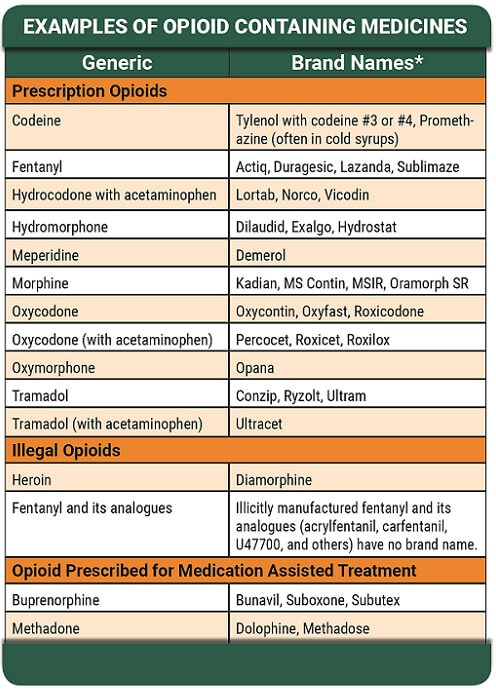Mark Halsey is a licensed therapist, founder, and chief editor of Clean Break Recovery. With over a decade of addiction treatment experience, Mark deeply understands...Read more
When it comes to understanding drug abuse, it is important to know what opiate drugs are. Opiate drugs are a class of powerful and potentially addictive pain medications. They can be used to treat chronic pain, although they can be dangerous if used improperly. In this article, we will explore what opiate drugs are, how they work, and potential risks associated with their use.
Opiates are drugs that are derived from the opium poppy plant. Common opiates include morphine, codeine, oxycodone, hydrocodone, and heroin. These drugs are used medically to treat severe pain, but can also be abused for their euphoric effects. Opiates can be highly addictive, and even short-term use can lead to physical and psychological dependence.

What are Commonly Used Opiate Drugs?
Opiate drugs are a class of drugs that are derived from the opium poppy plant and are used to help manage pain. These drugs are highly addictive and can cause physical and psychological dependence. Commonly used opiate drugs include morphine, codeine, hydrocodone, oxycodone, hydromorphone, and fentanyl.
Morphine is one of the most commonly used opiate drugs. It is typically used to treat severe pain, but it can also be used for medical procedures such as childbirth or surgery. Morphine is available in a variety of forms, including tablets, capsules, syrups, and injections. It can also be used for long-term pain management, such as for cancer or other chronic conditions.
Codeine is another commonly used opiate drug. It is typically used to treat mild pain, such as headaches, muscle aches, and toothaches. Codeine can also be used to treat coughs and colds. It is available in tablets, capsules, and syrups.
Hydrocodone
Hydrocodone is a powerful pain reliever that is often prescribed to treat moderate to severe pain. It is available in tablets, capsules, and syrups. It is also used to treat coughs and diarrhea. Hydrocodone can be highly addictive and should only be used under the supervision of a doctor.
Oxycodone
Oxycodone is another commonly used opiate drug. It is typically prescribed to treat moderate to severe pain. It is available in tablets, capsules, and syrups. Oxycodone can be highly addictive and should only be used under the supervision of a doctor.
Other Opiate Drugs
Hydromorphone is another opiate drug that is used to treat severe pain. It is available in tablets, capsules, and syrups. Hydromorphone is a powerful pain reliever and should only be used under the supervision of a doctor.
Fentanyl is a powerful opiate drug that is used to treat severe pain. It is available in tablets, patches, and injections. Fentanyl is a highly addictive drug and should only be used under the supervision of a doctor.
Heroin
Heroin is an illegal opiate drug that is highly addictive. It is usually injected, snorted, or smoked. Heroin is a dangerous drug that can lead to serious health problems, including overdose and death.
Prescription Opiate Drugs
Prescription opiate drugs are drugs that are prescribed by a doctor to treat pain. They include morphine, codeine, hydrocodone, oxycodone, hydromorphone, and fentanyl. Prescription opiate drugs can be highly addictive and should only be used under the supervision of a doctor.
Frequently Asked Questions
What Are Opiate Drugs?
Answer: Opiate drugs are a type of narcotic drug derived from the opium poppy plant. They are used to treat pain, coughing, and diarrhea, and act on the brain to produce a sense of euphoria. Examples of opiate drugs include codeine, morphine, and hydrocodone.
How Do Opiate Drugs Work?
Answer: Opiate drugs work by binding to opioid receptors in the brain and spinal cord, which are responsible for pain regulation, mood control, and reward pathways. This binding causes the release of endorphins, which produce a feeling of pleasure and relaxation, and also reduce the perception of pain.
What Are the Possible Side Effects of Opiate Drugs?
Answer: Common side effects of opiate drugs include constipation, nausea, confusion, drowsiness, and respiratory depression. Long-term use of opiates can lead to tolerance, physical dependence, and addiction. Other serious side effects can include liver damage, seizures, and coma.
Are Opiate Drugs Dangerous?
Answer: Yes, opiate drugs can be dangerous if misused or taken in large doses. Overdose can lead to coma and even death. Opiate drugs can also be habit-forming, and can cause physical and psychological dependence. If taken in combination with other drugs or alcohol, the effects can be even more dangerous.
Are There Non-Prescription Opiate Drugs?
Answer: Yes, there are some non-prescription opiate drugs, such as codeine and hydrocodone. These drugs are usually only available in combination with another drug, such as acetaminophen (Tylenol). They are usually only available in low doses and must be taken as directed.
What Are Some Treatment Options for Opiate Addiction?
Answer: Treatment for opiate addiction typically includes a combination of medication and therapy. Medication-assisted treatment, such as methadone or buprenorphine, can help reduce cravings and withdrawal symptoms. Therapy can also help to address the underlying issues that led to the addiction, and can provide coping skills for managing cravings and avoiding relapse.
This Is What Happens to Your Brain on Opioids | Short Film Showcase
In conclusion, opiate drugs are powerful pain medications that can be used to treat moderate to severe pain. They have the potential to be highly addictive and should only be used as prescribed by a doctor. With proper medical supervision and careful monitoring, opiate medications can be used safely and effectively to help manage pain and improve quality of life.
Mark Halsey is a licensed therapist, founder, and chief editor of Clean Break Recovery. With over a decade of addiction treatment experience, Mark deeply understands the complex needs of those struggling with addiction and utilizes a comprehensive and holistic approach to address them. He is well-versed in traditional and innovative therapies, including cognitive-behavioral therapy, motivational interviewing, and mindfulness-based interventions.
More Posts